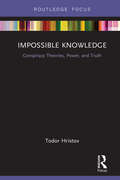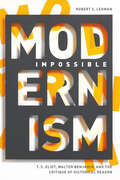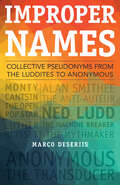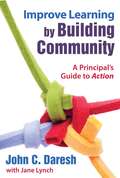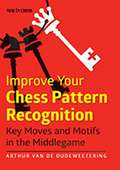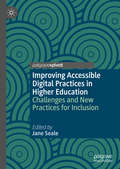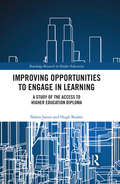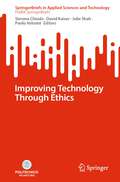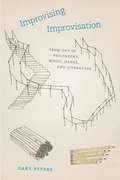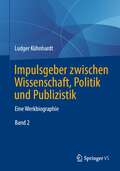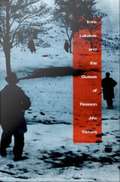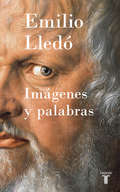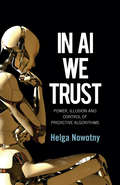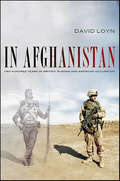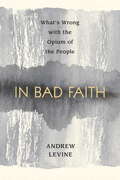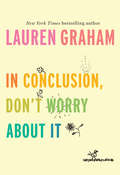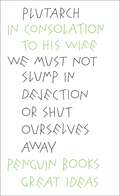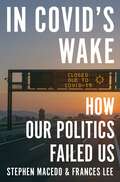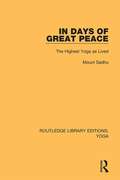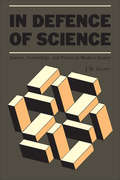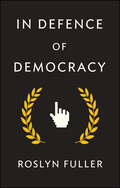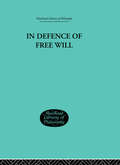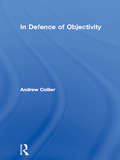- Table View
- List View
Impossible Knowledge: Conspiracy Theories, Power, and Truth (Conspiracy Theories)
by Todor HristovConspiracy theorists claim impossible knowledge, such as knowledge of the doings of a secret world government. Yet they accept this impossible knowledge as truth. In effect, conspiracy theories detach truth from knowledge. Knowledge without power is powerless. And the impossible knowledge claimed by conspiracy theorists is rigorously excluded from the regimes of truth and power – that is not even wrong. Yet conspiratorial knowledge is potent enough to be studied by researchers and recognized as a risk by experts and authorities. Therefore, in order to understand conspiracy theories, we need to think of truth beyond knowledge and power. That is impossible for any scientific discipline because it takes for granted that truth comes from knowledge and that truth is powerful enough to destroy the legitimacy of any authority that would dare to conceal or manipulate it. Since science is unable to make sense of conspiracy theories, it treats conspiracy theorists as individuals who fail to make sense, and it explains their persistent nonsense by some cognitive, behavioral, or social dysfunction. Fortunately, critical theory has developed tools able to conceive of truth beyond knowledge and power, and hence to make sense of conspiracy theories. This book organizes them into a toolbox which will enable students and researchers to analyze conspiracy theories as practices of the self geared at self-empowerment, a sort of political self-help.
Impossible Modernism: T. S. Eliot, Walter Benjamin, and the Critique of Historical Reason
by Robert LehmanImpossible Modernism reads the writings of German philosopher and critic Walter Benjamin (1892-1940) and Anglo-American poet and critic T. S. Eliot (1888-1965) to examine the relationship between literary and historical form during the modernist period. It focuses particularly on how they both resisted the forms of narration established by nineteenth-century academic historians and turned instead to traditional literary devices--lyric, satire, anecdote, and allegory--to reimagine the forms that historical representation might take. Tracing the fraught relationship between poetry and history back to Aristotle's Poetics and forward to Nietzsche's Untimely Meditations, Robert S. Lehman establishes the coordinates of the intellectual-historical problem that Eliot and Benjamin inherited and offers an analysis of how they grappled with this legacy in their major works.
Improper Life: Technology and Biopolitics from Heidegger to Agamben (Posthumanities)
by Timothy C. CampbellHas biopolitics actually become thanatopolitics, a field of study obsessed with death? Is there something about the nature of biopolitical thought today that makes it impossible to deploy affirmatively? If this is true, what can life-minded thinkers put forward as the merits of biopolitical reflection? These questions drive Improper Life, Timothy C. Campbell&’s dexterous inquiry-as-intervention.Campbell argues that a &“crypto-thanatopolitics&” can be teased out of Heidegger&’s critique of technology and that some of the leading scholars of biopolitics—including Michel Foucault, Giorgio Agamben, and Peter Sloterdijk—have been substantively influenced by Heidegger&’s thought, particularly his reading of proper and improper writing. In fact, Campbell shows how all of these philosophers have pointed toward a tragic, thanatopolitical destination as somehow an inevitable result of technology. But in Improper Life he articulates a corrective biopolitics that can begin with rereadings of Foucault (especially his late work regarding the care and technologies of the self), Freud (notably his writings on the drives and negation), and Gilles Deleuze (particularly in the relation of attention to aesthetics).Throughout Improper Life, Campbell insists that biopolitics can become more positive and productively asserts an affirmative technē not thought through thanatos but rather practiced through bíos.
Improper Names: Collective Pseudonyms from the Luddites to Anonymous (A Quadrant Book)
by Marco DeseriisImproper Names offers a genealogy and theory of the &“improper name,&” which author Marco Deseriis defines as the adoption of the same pseudonym by organized collectives, affinity groups, and individual authors. Although such names are often invented to pursue a specific social or political agenda, they are soon appropriated for different and sometimes diverging purposes. This book examines the tension arising from struggles for control of a pseudonym&’s symbolic power.Deseriis provides five fascinating and widely varying case studies. Ned Ludd was the legendary and eponymous leader of the English Luddites, textile workers who threatened the destruction of industrial machinery and then advanced a variety of economic and political demands. Alan Smithee—an alias coined by Hollywood film directors in 1969 in order to disown films that were recut by producers—became a contested signature and was therefore no longer effective to signal prevarication to Hollywood insiders. Monty Cantsin was an &“open pop star&” created by U.S. and Canadian artists in the late 1970s to critique bourgeois notions of authorship, but its communal character was compromised by excessive identification with individual users of the name. The Italian media activists calling themselves Luther Blissett, aware of the Cantsin experience, implemented measures to prevent individuals from assuming the alias, which was used to author media pranks, sell apocryphal manuscripts to publishers, fabricate artists and artworks, and author best-selling novels. The longest chapter here is devoted to the contemporary &“hacktivist&” group known as Anonymous, which protests censorship and restricted access to information and information technologies.After delving into a rich philosophical debate on community among those who have nothing in common, the book concludes with a reflection on how the politics of improper names affects present-day anticapitalist social movements such as Occupy and 15-M.
Improve Learning by Building Community: A Principal?s Guide to Action
by Jane Lynch John DareshWritten for both new and experienced principals, this resource provides a blueprint for building visionary learning communities that improve student learning not only by shaping the internal school community--faculty and staff--but also by creating a partnership with the external community--district educators, families, community organizations, and service agencies. Administrators will find invaluable assistance from Practical Tips that offer strategies for implementation, Points for Practicethat highlight critical concepts and Points to Ponder that promote reader reflection. Each chapter encourages school leaders to consider what community building means for their own schools and provides guidance for: * Building a vision based on your personal and professional values * Shaping a school culture that supports teamwork * Honoring school staff members at all levels * Examining and understanding the external environment * Drawing effectively on community support services * Collaborating with district staff Improve Learning by Building Community helps principals bring together all stakeholders to create the kind of schools that can ensure success for every student.
Improve Your Chess Pattern Recognition: Key Moves and Motifs in the Middlegame
by Arthur van de OudeweeteringPlenty of scientific books have been written about pattern recognition; this will not be one of them. Sure enough, this book is about patterns, but it's mainly about chess. Another thing that should be clear from the start is that you will not encounter tactical patterns here, like for instance all kinds of mate images. In this book you will find predominantly positional patterns.
Improving Accessible Digital Practices in Higher Education: Challenges and New Practices for Inclusion
by Jane SealeThis book examines the role played by technologies in removing the disadvantage experienced by students with disabilities in higher education. Addressing five key themes, the editor and contributors explore the practices required of stakeholders within higher education institutions to mediate successful and supportive relationships between disabled learners and their technologies. Ultimately, the book argues that practice in the fields of disability, ICT and higher education is still not providing consistent and widespread positive learning experiences to students with disabilities. In order to address this situation, the field needs to creatively integrate knowledge gained through both research and practice, and to re-imagine what is needed for ICT to meaningfully contribute to a reduction in disadvantage for disabled students. This book will be of interest and value to scholars of disability studies, education and accessibility, and educational technologies.
Improving Opportunities to Engage in Learning: A Study of the Access to Higher Education Diploma (Routledge Research in Higher Education)
by Hugh Busher Nalita JamesImproving Opportunities to Engage in Learning investigates the experiences of mature adult learners returning to formal education. The book challenges the policy discourses in which Access to Higher Education survives by suggesting that continuing education is more about determination by students to alter their identities and career opportunities than meeting narrow performative criteria of financial targets. Chapters explore students’ struggles with institutional and social structures in the current political and socio-economic climate, before identifying how the transformation of their learner identities is facilitated in the courses by collaborative cultures and supportive tutors. The book addresses a research gap in knowledge about students’ and tutors’ experiences of Access to Higher Education courses, presenting a broad perspective on the importance and difficulties of such courses through listening to the voices of students and tutors undertaking a variety of Access to HE pathways. The authors argue that despite success on their courses benefiting the national economy as well as students individually, the social and financial costs of continuing education is almost entirely shifted onto students’ shoulders by policymakers. Despite the costs, students can still see Access to HE as a chance to improve their lives, reflecting the neoliberal discourse of personal responsibility and risk embedded in broader national social and policy discourses. Improving Opportunities to Engage in Learning will be of great interest to researchers, academics and postgraduate students in the fields of further and higher education, widening participation, social justice and sociology of education, and education policy and politics.
Improving Technology Through Ethics (SpringerBriefs in Applied Sciences and Technology)
by David Kaiser Julie Shah Simona Chiodo Paolo VolontéThis book deals with the ethics of technology and addresses specific ethical problems related to some emerging technologies, mainly in the field of computer science (from machine learning models to extracting value from data to human–robot interaction). The contributions are authored mainly by scholars in ICT and other engineering fields who reflect on ethical and societal issues emerging from their own research activity. Thus, rather uniquely, the work overcomes the traditional divide between pure ethical theory that disregards what practitioners do and mere R&D practice that ignores what theorists conceptualize. Conversely, the reader is enabled to understand what ethics means when it is actually put into work by engineering researchers. The book arises from a joint program between MIT and Politecnico di Milano aimed at training early career researchers in addressing the ethical issues of technology and critically reflecting on the social impacts of the emerging, and even disruptive, technologies they are currently developing through their novel research. Overall, it aims at spreading the task of developing technologies that, from the beginning, are designed to be responsible for human life, society, and nature.
Improvising Improvisation: From Out of Philosophy, Music, Dance, and Literature
by Gary PetersThere is an ever-increasing number of books on improvisation, ones that richly recount experiences in the heat of the creative moment, theorize on the essence of improvisation, and offer convincing arguments for improvisation’s impact across a wide range of human activity. This book is nothing like that. In a provocative and at times moving experiment, Gary Peters takes a different approach, turning the philosophy of improvisation upside-down and inside-out. Guided by Kant, Hegel, Heidegger, and especially Deleuze—and exploring a range of artists from Hendrix to Borges—Peters illuminates new fundamentals about what, as an experience, improvisation truly is. As he shows, improvisation isn’t so much a genre, idiom, style, or technique—it’s a predicament we are thrown into, one we find ourselves in. The predicament, he shows, is a complex entwinement of choice and decision. The performativity of choice during improvisation may happen “in the moment,” but it is already determined by an a priori mode of decision. In this way, improvisation happens both within and around the actual moment, negotiating a simultaneous past, present, and future. Examining these and other often ignored dimensions of spontaneous creativity, Peters proposes a consistently challenging and rigorously argued new perspective on improvisation across an extraordinary range of disciplines.
Impulsgeber zwischen Wissenschaft, Politik und Publizistik: Eine Werkbiographie
by Ludger KühnhardtLudger Kühnhardt, weltweit tätiger Politikwissenschaftler, Berater und Publizist, gibt lebhafte und persönliche Einblicke in die Menschen und Quellen seiner Prägung, in die Denkwege, denen er gefolgt ist, und in die Impulse, die sein Wirken in Forschung und Lehre über Jahrzehnte hinweg ausgelöst hat. Ein biografischer Werkstattbericht von hoher Authentizität, der zusammenführt, was inmitten des beruflichen Alltags oft unverbunden erscheint. Immer wieder aus anderer Perspektive werden Einsichten beleuchtet, die ihrer Zeit voraus waren, und Befunde erinnert, die zeitlos aktuell geblieben sind. Eine lebendig geschriebene Werkbiographie über die inneren Antriebskräfte und äußeren Zusammenhänge eines kosmopolitischen public intellectual als aufklärerischer und beratender Impulsgeber im Wechselspiel von Wissenschaft, Politik und Publizistik. Das Buch spiegelt deutsche, europäische und globale Zeitgeschichte von der Mitte des 20.Jahrhunderts bis ins dritte Jahrzehnt des 21.Jahrhunderts in einem wissenschaftlichen Werk und seiner Einordnung als Zeugnis politischer Kultur.
Imre Lakatos and the Guises of Reason
by John KadvanyThe Hungarian migr Imre Lakatos (1922-1974) earned a worldwide reputation through the influential philosophy of science debates involving Thomas Kuhn, Paul Feyerabend, and Sir Karl Popper. In Imre Lakatos and the Guises of Reason John Kadvany shows that embedded in Lakatos's English-language work is a remarkable historical philosophy rooted in his Hungarian past. Below the surface of his life as an Anglo-American philosopher of science and mathematics, Lakatos covertly introduced novel transformations of Hegelian and Marxist ideas about historiography, skepticism, criticism, and rationality. Lakatos escaped Hungary following the failed 1956 Revolution. Before then, he had been an influential Communist intellectual and was imprisoned for years by the Stalinist regime. He also wrote a lost doctoral thesis in the philosophy of science and participated in what was criminal behavior in all but a legal sense. Kadvany argues that this intellectual and political past animates Lakatos's English-language philosophy, and that, whether intended or not, Lakatos integrated a penetrating vision of Hegelian ideas with rigorous analysis of mathematical proofs and controversial histories of science. Including new applications of Lakatos's ideas to the histories of mathematical logic and economics and providing lucid exegesis of many of Hegel's basic ideas, Imre Lakatos and the Guises of Reason is an exciting reconstruction of ideas and episodes from the history of philosophy, science, mathematics, and modern political history.
Imágenes y palabras
by Emilio LledóSencillo, profundo, uno de los libros clave de Emilio Lledó, gran exponente de la filosofía española contemporánea. «Este libro plantea, desde distintas perspectivas, algunas de las cuestiones relacionadas con una nueva visión de las llamadas "Humanidades". En realidad no hay forma alguna de conocimiento que no tenga que ver con los seres humanos y que no venga de ellos. Sorprende, pues, que se siga hablando de saber humanístico y saber científico como si no fueran hombres los que hacen también la Ciencia. Es hora ya de ir completando y extendiendo un concepto de humanismo que comprenda, en un bloque común de intereses, esas dos formas de cultura. »En estas páginas se apunta a un horizonte en el que sea posible superar esa injustificada y envejecida división. Los diferentes apartados que constituyen este libro tratan de arte, de filosofía, de literatura, de educación y, en ellos, aparecen algunas de las ideas sobre las que se ha levantado ese maravilloso mundo de la cultura, obra exclusiva de los seres humanos. Un mundo al que no podemos renunciar porque sería renunciar a la propia vida. El cuidado de ese universo ideal y real, y el esfuerzo por que se cultivo sea cada vez mejor y más libre es una de nuestras irrenunciables tareas. »La memoria de la cultura, el análisis renovado y aleccionador de los niveles y estímulos que encierra esa memoria, es una empresa apasionante y solidaria. Las páginas de este libro pretenden ser un pequeño paso en ese camino. Un camino nada utópico porque permite divisar "la realidad de la utopía": un territorio de posibilidad y libertad.»Emilio Lledó Esencial en la obra de Emilio Lledó, Imágenes y palabras es una hermosa recopilación de sus preocupaciones y obsesiones, en otras palabras, de lo que considera el centro del humanismo. Lenguaje, ética, arte, literatura, razón, libertad, felicidad, memoria... todos sus grandes temas están presentes, abordados desde perspectivas variadas y sin pretensiones de verdades absolutas. Un libro que es una excelente muestra del afán de claridad y de diálogo de este autor, y una maravillosa invitación a adoptar un sentido humanístico de la vida.
In AI We Trust: Power, Illusion and Control of Predictive Algorithms
by Helga NowotnyOne of the most persistent concerns about the future is whether it will be dominated by the predictive algorithms of AI – and, if so, what this will mean for our behaviour, for our institutions and for what it means to be human. AI changes our experience of time and the future and challenges our identities, yet we are blinded by its efficiency and fail to understand how it affects us. At the heart of our trust in AI lies a paradox: we leverage AI to increase our control over the future and uncertainty, while at the same time the performativity of AI, the power it has to make us act in the ways it predicts, reduces our agency over the future. This happens when we forget that that we humans have created the digital technologies to which we attribute agency. These developments also challenge the narrative of progress, which played such a central role in modernity and is based on the hubris of total control. We are now moving into an era where this control is limited as AI monitors our actions, posing the threat of surveillance, but also offering the opportunity to reappropriate control and transform it into care. As we try to adjust to a world in which algorithms, robots and avatars play an ever-increasing role, we need to understand better the limitations of AI and how their predictions affect our agency, while at the same time having the courage to embrace the uncertainty of the future.
In Afghanistan: Two Hundred Years of British, Russian and American Occupation
by David LoynAfghanistan has been a strategic prize for foreign empires for more than 200 years. The British, Russians, and Americans have all fought across its beautiful and inhospitable terrain, in conflicts variously ruthless, misguided and bloody. This violent history is the subject of David Loyn's magisterial book. It is a history littered with misunderstandings and broken promises, in which the British, the Russians, and later the Americans, constantly underestimated the ability of the Afghans. In Afghanistan brilliantly brings to life the personalities involved in Afghanistan's relationship with the world, chronicling the misunderstandings and missed opportunities that have so often led to war. With 30 years experience as a foreign correspondent, David Loyn has had a front-row seat during Afghanistan's recent history. In Afghanistan draws on David Loyn's unrivalled knowledge of the Taliban and the forces that prevail in Afghanistan, to provide the definitive analysis of the lessons these conflicts have for the present day.
In Bad Faith
by Andrew LevineFor readers interested in political theory and political activism, as well as anyone puzzled by the persistence of theistic conviction in the modern world. In light of rational standards for belief acceptance that are universally acknowledged in enlightened circles, theistic convictions are deeply problematic. Thus it is not surprising that some of the most important heirs of the Enlightenment tradition--Ludwig Feuerbach, Émile Durkheim, Sigmund Freud, and Friedrich Nietzsche--wondered, implicitly, why belief in God persists and even flourishes among those who should and in some sense do know better. This political philosopher provides fresh insight into the work of those thinkers by reflecting on the explanations they proffered and on their explanatory strategies. For all their many differences, their respective explanations share a common core and are driven by a similar (largely unelaborated) normative commitment. On Levine's account, believers today believe in bad faith--in other words, they evince a fundamental intellectual dishonesty. If only for this reason, they merit reproach, even in the comparatively rare instances when "faith perspectives" do more good than harm. From this standpoint, the author reflects on the liberal turn in the so-called Abrahamic religions (Judaism, Christianity, and Islam) and depicts liberal religion as a vehicle of exit for those who implicitly acknowledge the untenability of the beliefs they profess, yet are unable or unwilling to face this reality squarely. He argues that liberal religion is therefore a transitory phenomenon, albeit one that has survived for a long time and that is not about to expire soon. Levine then faults the religious Left on this account, arguing that even in those historically rare conditions where bad faith motivates welcome political engagement, it is nevertheless undermined by its deep inauthenticity.
In Between Communication Theories Through One Hundred Questions (Numanities - Arts and Humanities in Progress #14)
by Tomas Kačerauskas Algis MickūnasThis book takes the form of a dialogue. It presents two authors, specialized in the phenomenologу, posing questions to each other and offering complex answers for critical discussion. The book includes both presentation of different communication schools and philosophizing on the issues of communication. The authors debate numerous topics by providing the definition and etymology of communication, examining the limits of communication, and using a poli-logical base of communication. The issue which pervades all domains is that of mediation: how things, such as identities, styles, and bodies are mediated by culture, history, and tradition, and what the limits are of such mediation. This question leads to more complex issues of “mediated mediations” such that an explication of one medium is framed by another medium, leading to a question of meta-language as a fundamental, unmediated medium. This involves some fine points of mediation: perspectivity, discursivity, ethics of communication, ideology, private and public. Throughout the mutual, interrogative dialogue, the authors touch upon, but avoid the daunting commitment to, a theory of metacommunication, as well as the “transcendental” problematic of accessing the numerous theoretical, thematic, and historical aspects of communication.
In Conclusion, Don't Worry About It
by Lauren GrahamAdvice for graduates and reflections on staying true to yourself from the beloved Gilmore Girls actress and New York Times bestselling author of the memoir Talking as Fast as I Can and the novel Someday, Someday, Maybe. “If you’re kicking yourself for not having accomplished all you should have by now, don’t worry about it. Even without any ‘big’ accomplishments yet to your name, you are enough.” In this expansion of the 2017 commencement speech she gave at her hometown Langley High, Lauren Graham, the beloved star of Gilmore Girls and Parenthood, reflects on growing up, pursuing your dreams, and living in the here and now. “Whatever path you choose, whatever career you decide to go after, the important thing is that you keep finding joy in what you’re doing, especially when the joy isn’t finding you.” In her hilarious, relatable voice, Graham reminds us to be curious and compassionate, no matter where life takes us or what we’ve yet to achieve. Grounded and inspiring—and illustrated throughout with drawings by Graham herself—here is a comforting road map to a happy life. “I’ve had ups and downs. I’ve had successes and senior slumps. I’ve been the girl who has the lead, and the one who wished she had the bigger part. The truth? They don’t feel that different from each other.”
In Consolation to his Wife
by PlutarchFrom an intimate and moving letter to his grieving wife on the death of their daughter, to elegant writings on morality, happiness and the avoidance of anger, Plutarch’s powerful words of consolation and inspiration still offer timeless wisdom and guidance today. Throughout history, some books have changed the world. They have transformed the way we see ourselves – and each other. They have inspired debate, dissent, war and revolution. They have enlightened, outraged, provoked and comforted. They have enriched lives – and destroyed them. Now Penguin brings you the works of the great thinkers, pioneers, radicals and visionaries whose ideas shook civilization and helped make us who we are.
In Covid's Wake: How Our Politics Failed Us
by Stephen Macedo Frances LeeFeatured on the New York Times' The Daily podcast and CNN's Fareed Zakaria GPSWhat our failures during the pandemic cost us, and why we must do betterThe Covid pandemic quickly led to the greatest mobilization of emergency powers in human history. By early April 2020, half the world&’s population—3.9 billion people—were living under quarantine. People were told not to leave their homes; businesses were shuttered, employees laid off, and schools closed for months or even years. The most devastating pandemic in a century and the policies adopted in response to it upended life as we knew it. In this eye-opening book, Stephen Macedo and Frances Lee examine our pandemic response and pose some provocative questions: Why did we ignore pre-Covid plans for managing a pandemic? Were the voices of reasonable dissent treated fairly? Did we adequately consider the costs and benefits of different policy options? And, aside from vaccines, did the policies adopted work as intended?With In Covid&’s Wake, Macedo and Lee offer the first comprehensive—and candid—political assessment of how our institutions fared during the pandemic. They describe how, influenced by Wuhan&’s lockdown, governments departed from their existing pandemic plans. Hard choices were obscured by slogans like &“follow the science.&” Benefits and harms were distributed unfairly. The policies adopted largely benefited the laptop class and left so-called essential workers unprotected; extended school closures hit the least-privileged families the hardest. Science became politicized and dissent was driven to the margins. In the next crisis, Macedo and Lee warn, we must not forget the deepest values of liberal democracy: tolerance and open-mindedness, respect for evidence and its limits, a willingness to entertain uncertainty, and a commitment to telling the whole truth.
In Days of Great Peace: The Highest Yoga as Lived (Routledge Library Editions: Yoga #3)
by Mouni SadhuFor several years Mouni Sadhu steeped himself in the teachings of the foremost Hindu ascetic, Sri Ramana Maharshi. This book, first published in 1957, is the best attempt by a European to describe without technicalities what such teachings entail, what meditation is about, and why Indians worship their gurus. Mouni Sadhu’s rare facility for describing his own mental and spiritual states enables him to pass on to the reader his knowledge and enthusiasm. It is an authentic account of life with an inspired Hindu yogi and spiritual teacher.
In Defence of Science: Science, Technology, and Politics in Modern Society
by Jack GroveScience holds a central role in the modern world, yet its complex interrelationships with nature, technology, and politics are often misunderstood or seen from a false perspective. In a series of essays that make extensive use of original work by sociologists, historians, and philosophers of science, J.W. Grove explores the roles and relationships of science in modern technological society. Modern Science can be viewed from four related perspectives. It is an expression of human curiosity – a passion to understand the natural world: what it is made of, how it is put together, and how it works. It is a body of practice – a set of ways of finding out that distinguish it from other realms of inquiry. It is a profession – a body of men and women owing allegiance to the pursuit of knowledge – and for those people, a career. And it is a prescriptive enterprise in that the increase of scientific understanding makes it possible to put nature to use in new kinds of technology. Each of these aspects of science is today the focus of critical scrutiny and, often, outright hostility. With many examples, Grove exposes the threats to science today: its identification with technology, its subordination to the state, the false claims made in its name, and the popular intellectual forces that seek to denigrate it as a source of human understanding and progress.
In Defence of Democracy
by Roslyn FullerShould Brexit or Trump cause us to doubt our faith in democracy? Are ‘the people’ too ignorant or stupid to rule? Numerous commentators are seriously arguing that the answer to these questions might be ‘yes’. In this take-no-prisoners book, Canadian-Irish author Roslyn Fuller kicks these anti-democrats where it hurts the most – the facts. Fuller shows how many academics, journalists and politicians have embraced the idea that there can be ‘too much democracy’, and deftly unravels their attempts to end majority rule, whether through limiting the franchise, pursuing Chinese ‘meritocracy’ or confining participation to random legislation panels. She shows that Trump, Brexit or whatever other political event you may have disapproved of recently aren’t doing half the damage to democracy that elite self-righteousness and corruption are. In fact, argues Fuller, there are real reasons to be optimistic. Ancient methods can be combined with modern technology to revitalize democracy and allow the people to truly rule. In Defence of Democracy is a witty and energetic contribution to the debate on the future of democracy.
In Defence of Free Will: With other Philosophical Essays
by Campbell, C AFirst published in 2002. Routledge is an imprint of Taylor & Francis, an informa company.
In Defence of Objectivity (Routledge Studies in Critical Realism)
by Andrew CollierFirst Published in 2004. Routledge is an imprint of Taylor & Francis, an informa company.
